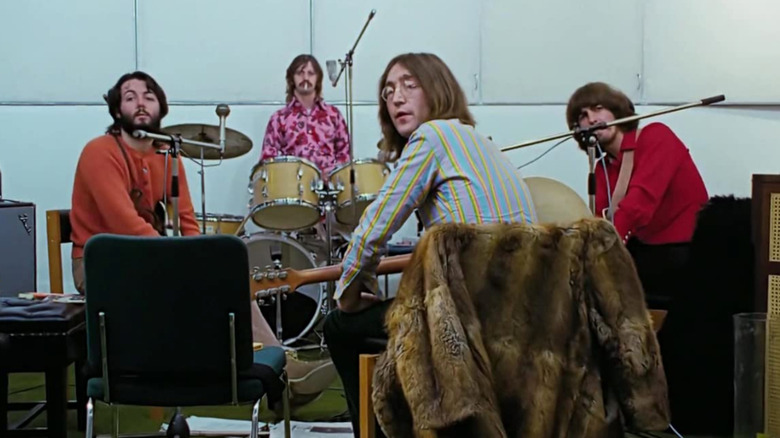A Major Twist Was Hiding In Glass Onion's Title All Along
Warning: this post contains major spoilers for "Glass Onion: A Knives Out Story."
You should probably know by now that the "Knives Out" movies are not as straightforward as they initially seem. After all, what murder mystery is? However, the second entry in Rian Johnson's mystery franchise, "Glass Onion," takes things to a whole new level. Just like the titular vegetable, there are a lot of layers to peel back with this new group of suspects, each with their own perfectly justified reason to kill the victim at the center of this mystery.
However, what if that very victim, the person that someone in this cast of characters wanted to kill, wasn't actually dead? What if they were simply pretending to be someone that the suspect wanted dead? Well, that's one of the many twists that "Glass Onion" has throughout its runtime. For the first half of the film, viewers were left to believe that former tech giant Cassandra "Andi" Brand (Janelle Monáe) was the to-be victim of one of her former group of friends' rage, supposedly getting shot to death. However, it turns out that Andi wasn't Andi at all, but rather, her twin sister Helen (also Monáe). Furthermore, Helen avoided death thanks to a notebook blocking the bullet from striking her.
While this was pretty shocking to see play out, we honestly should have seen it coming. That's because this twist has been staring right at us this entire time. That is if you knew about a certain, infamous music conspiracy theory.
Looking through the Glass Onion
In 1968, The Beatles released their ninth studio album of the same name, which is also often referred to as "The White Album." Included in this double album was the song "Glass Onion," which songwriter John Lennon told Rolling Stone was about his frustrations with fans seemingly overanalyzing the band's lyrics. As a response, he purposefully wrote lyrics that reference other songs at random and just generally didn't make much sense. However, there is one specific reference made in the song that very likely could have inspired Johnson to write that killer twist:
"I told you about the walrus and me, man
You know we're as close as can be, man
Well here's another clue for you all
The walrus was Paul."
If you're not familiar with the "Paul is Dead" conspiracy, here's a brief refresher. During the early days of The Beatles' disbandment, a conspiracy theory stemming from a 1969 Detroit radio mix-up began circulating that guitarist and vocalist Paul McCartney had died in 1966 and was replaced by a lookalike. One of the songs most closely scrutinized by believers of this theory was 1967's "I Am The Walrus," which is what the walrus in "Glass Onion" is referring to. The popular interpretation was that "I Am The Walrus" was about Paul's supposed death from intoxicated driving, and that the titular mammal was his corporeal form. While both songs were released before the theory's circulation, they were both used as important evidence to support it.
Playing the game
Perhaps this is a bit hypocritical considering how the original "Glass Onion" directly condemns deep analysis, but the decision to title the second "Knives Out" movie after the song seems to be quite intentional. After all, the parallels are as plain as can be. Similarly to how the song "Glass Onion" is known nowadays as one of the supposed clues of a death cover-up, the movie of the same name involves a kindred conspiracy in its plot. Coincidence? No way.
However, unlike Paul's supposed car crash, Andi Brand was murdered in cold blood. The murderer had intended for her death to be kept quiet and out of sight from the public eye. He even wanted to ensure his friends didn't know about it — after all, they were there to have a fun Greek vacation. The killer just didn't count on her twin sister to find anything suspicious about her death, and they especially didn't count on her bringing along the world's greatest detective to their yearly get-together.
It's hard to imagine that Rian Johnson didn't make the connection between Helen's faked death and the modern significance that The Beatles' "Glass Onion" has in the band's legacy. If he didn't, then it's one hell of an instance of serendipity, but considering how much detail he puts into these movies, it was likely all a part of the grand mystery.
"Glass Onion: A Knives Out Mystery" is now playing for one week in theaters before arriving on Netflix on December 23.


